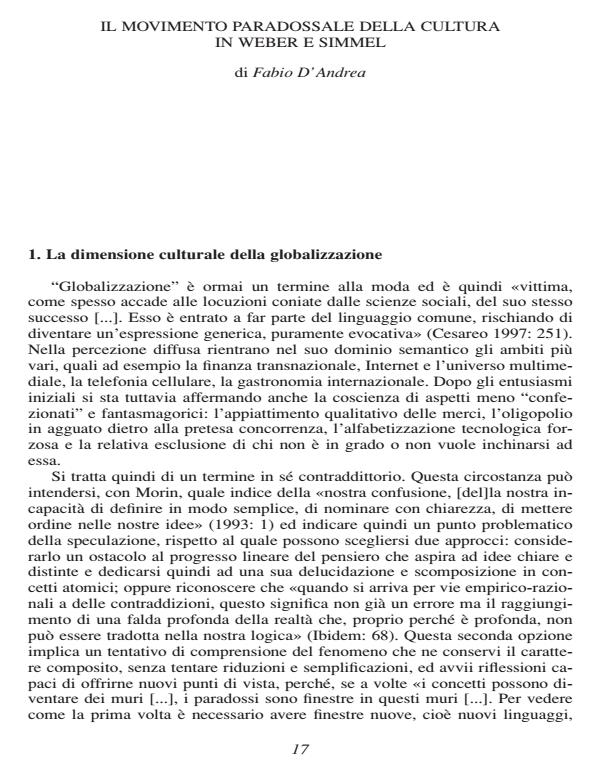Il movimento paradossale della cultura in Weber e Simmel
Titolo Rivista SOCIOLOGIA DELLA COMUNICAZIONE
Autori/Curatori Fabio D'Andrea
Anno di pubblicazione 2002 Fascicolo 2001/31 Lingua Italiano
Numero pagine 12 P. Dimensione file 63 KB
DOI
Il DOI è il codice a barre della proprietà intellettuale: per saperne di più
clicca qui
Qui sotto puoi vedere in anteprima la prima pagina di questo articolo.
Se questo articolo ti interessa, lo puoi acquistare (e scaricare in formato pdf) seguendo le facili indicazioni per acquistare il download credit. Acquista Download Credits per scaricare questo Articolo in formato PDF

FrancoAngeli è membro della Publishers International Linking Association, Inc (PILA)associazione indipendente e non profit per facilitare (attraverso i servizi tecnologici implementati da CrossRef.org) l’accesso degli studiosi ai contenuti digitali nelle pubblicazioni professionali e scientifiche
Globalisation is a worldwide phenomenon; nevertheless it is misunderstood in some measure, above all in its less obvious and evident aspects. Actually there are the political and cultural dimensions besides the economical one. In particular the latter is the key dimension of the process took into exam, as important as the economical one, although it has been overshadowed in experts’ consideration up to now. In order to better understand its importance, with regard to the apparently paradoxical dynamics between globalisation and sectionalism, this essay resorts to the Weber and Simmel texts, underlining the intrinsically paradoxical quality of the culture, a human being’s creation to give a sense to the reality. The culture tends to be perceived like "natural", although it is the result of an arbitrary, value-based selection of features of the reality. This supposed "naturalness" is the only trick that allows the culture to meet the human being’s needs of assurance and construction of meaning, but makes it unable to set up useful contacts and exchanges with other cultures bearing the same needs, and it brings necessarily to conflict with them. This is one of the vectors able to give a key to understand the strengthening of sectionalisms in an age of supposed globalisation. A culture that doesn’t open up to the otherness is unable to appreciate the complexity and richness of the reality and, after all, it doesn’t accomplish one of its most important task, a constant sending back to what exists out of itself. Just the knowledge of the non-natural feature of the culture can avoid a conflict among members of different cultures and promote collaboration and exchange among them. However this concept must be the object of a thorough and tactful educational transfer, because focusing the exploitable feature of the culture takes the individual great part of those primary supports that allow him/her to face the daily existence. However this educational project and the resources to its implementation will be adequately pursued only when the globalisation’s cultural dimension will be accepted.;
Fabio D'Andrea, Il movimento paradossale della cultura in Weber e Simmel in "SOCIOLOGIA DELLA COMUNICAZIONE " 31/2001, pp , DOI: